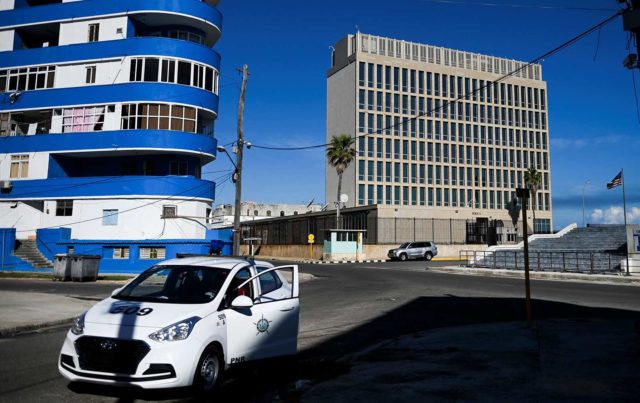
US will increase consular staffing in Cuba but ‘Havana syndrome’ concerns still linger View of the U.S. Embassy in Havana, on Feb. 3, 2022. (Yamil Lage/AFP via Getty Images/TNS)
The Biden administration is expected to announce a partial staffing increase in the U.S. Embassy in Havana that will help address a yearslong visa backlog affecting thousands of Cuban American families, a source familiar with the plan said.
Last month, Assistant Secretary of State Brian Nichols told lawmakers the plan involved sending temporary duty officers to Havana to help with immigration visa processing. The top U.S. diplomat in Havana, Timothy Zuñiga-Brown, is expected to make the formal announcement in a news conference Thursday in Havana.
Still, the plan does not involve fully restoring the embassy operations to their previous levels, the source said. The source, who was not authorized to discuss the plan details, asked to remain anonymous.
The Biden administration is still investigating a cluster of unexplained events that affected the health of U.S. diplomats and officials in Havana starting in late 2016. They developed symptoms that mimic a concussion and that have become known as “Havana syndrome.”
The events led the Donald Trump administration to evacuate non-emergency personnel in Havana and shut down most consular services in 2017. The processing of immigration visas moved to the U.S. Embassy in Colombia and then to Guyana.
More than 90,000 family-sponsored immigrant visa petitions for Cubans are pending, according to the State Department’s most recent figures for 2021.
The Trump administration also suspended the Cuban Family Reunification Parole Program, which allowed Americans to bring their family members to the U.S. sooner than through the regular process.
It is unclear if Cubans wanting to apply for visitor visas will benefit from the increased staffing. Currently, most Cubans also have to travel to a third country to obtain a non-immigrant visa.
President Joe Biden had vowed to reverse some of these measures and conduct a full review of U.S. Cuba policy, but a deterioration of human rights on the island after anti-government protests last year halted the process, U.S. officials said.
___
© 2022 Miami Herald Distributed by Tribune Content Agency, LLC




